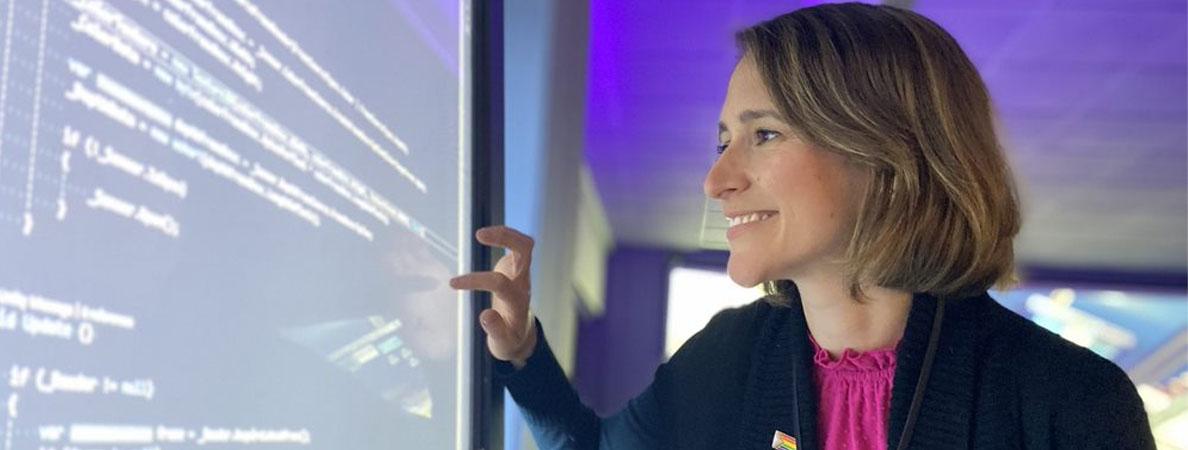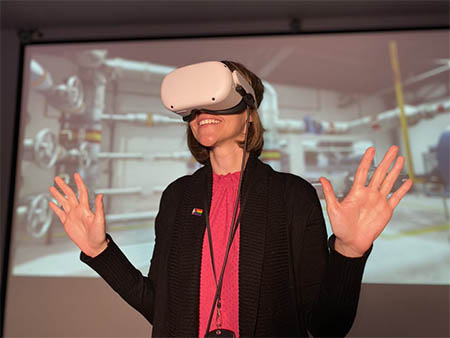
One of the most powerful aspects in stories is finding relatable characters and feeling represented in popular media. Lisa Funnell, Associate Dean of Creatives Industries at Mohawk College, has spent her career advocating for the importance of representation, equity, diversity, and inclusion (EDI) in media.
Recently, Lisa has been using her experience to help craft one of Mohawk’s newest programs, the Game – Design Diploma. She has spent much of her life learning and is an expert in the importance of representation in media. “I have a Degree in Arts and Science from McMaster University, a Master's Degree in Popular Culture from Brock University, a Ph.D. in Literary and Theater Studies in English with a specialization in film and gender from Wilfrid Laurier University, and I spent a decade as a professor and an administrator at the University of Oklahoma,” she says.
Her expertise has allowed her to create a history of influencing proper representation in media. “I was working in the Women’s and Gender Studies program in Oklahoma, I was their media specialist,” says Lisa. “I did a lot of work on media representation, I’ve done work on the #MeToo movement in Hollywood, representation in James Bond films, and so on.”

Lisa was born in Hamilton and was excited by the opportunity to return home and work with Mohawk College. “Equity, diversity and inclusion (EDI) has always been on the forefront when it comes to being an academic in the media space, and when there was this opportunity to come back to Hamilton to work at Mohawk College as the Associate Dean of Creative Industries, I jumped at the chance and it has been the best decision that I’ve ever made,” she says.
In her role as Associate Dean, Lisa and her team have been working hard to create the Game – Design program at Mohawk. “Our goal is to create a program that models rather than mirrors industry standards. There’s a responsibility when you’re a creator,” says Lisa. “What does it mean to be an inclusive and ethical creator? Is this just a moral stance, or is there business value?
“We’re talking about creative industries where collaboration is key. You need EDI, you need open mindedness in order to collaborate and get the best out of people. You need to be able to speak with people who are different than you and utilize their ideas. I believe diversity is the cornerstone of collaboration and creation,” she says.
The Game Design program at Mohawk has been designed to include EDI at every level. “We’re doing a lot of really unique things,” says Lisa. “We’re mapping learning objectives such as Indigenous learning objectives, EDI objectives, accessibility objectives. We’re really creating a program that is a flagship program for Mohawk College, that is completely in line with our strategic plan.”
Lisa recognizes the power of video games to influence people’s lives, as they’ve been there for her when she needed them. “I know the positive impact video games can have. I played them during the pandemic. They made me feel connected and productive,” says Lisa. “I got to explore different types of games and engage with different communities online.
An avid gamer, Lisa is well versed in the world of video games. “I grew up playing games. I had an Atari, a Commodore 64, the first Nintendo, Sega systems, Playstations, you name it,” she says. “For me, it was also a way to help me academically.”
She would use her games as an incentive system to make sure important tasks were completed. “I’ve had to write many different projects: undergraduate thesis, Master's thesis, PhD dissertation, books – there’s a lot of stuff,” Lisa says. “The one way that I would treat myself is by working hard during the day and knowing at a certain time, I can turn off my work and turn on the video games. It was a way for me to relax, but still feel productive.”
Her proudest gaming memory is bittersweet but steeped in accomplishment. “I was writing my Master's thesis on the Bond Girl phenomenon, and I was playing Final Fantasy X,” says Lisa. “I finished and submitted my Master's thesis in very close proximity to when I finished the game, and the game ends on a devastating note.
“I was relieved to finish my thesis, and then I played this game, and it was devastating at the end, and I cried – I felt like I cried out the game, but I also cried out the stress of finishing my Master's thesis. Because my gaming and my work are so intertwined, I can’t untangle them. A very monumental thing in terms of professional accomplishment is tied to this gaming accomplishment, even though it’s not a celebratory end to Final Fantasy X,” she says.
Between her work and her hobby, Lisa feels her life has come full circle. “Being able to come here and play a formative role in developing a program like Game – Design that means so much, and knowing the impact that it could have, makes me so passionate about the work that I’m doing and the team that I get to work with. It doesn’t feel like work, it feels like the right thing to do.”
After pouring her passion into the program, Lisa can’t wait for students to learn in the program she’s helped to create. “I’m so excited for students to get into our spaces and dig in, to start engaging in design thinking and looking at the psychology of games, talking about representation, looking at the industry for the realities that it has and understanding that they can be changemakers,” she says. “Teaching them different tools and techniques about how to collaborate, the importance of difference – that to me is a very exciting prospect, and why I can’t wait for fall 2023 to get here to really have the students in our space and experience what we’ve been planning all this time.”
According to Lisa, anyone is welcome in the Game - Design program. “I love diversity in terms of our student population, which includes age, experience, as well as a range of other demographic qualities,” she says. “We are a very welcoming program, and the truth of the matter is that diversity makes our classrooms better.
“If you like gaming, this program is aimed at you. If you’re in the space, we would love for you to come to this program. If you’re interested in gaming, if you have that curiosity we’re looking for, if you’ve seen our program and some part of it resonates with you, this is a program for you and our doors are open,” she says.




